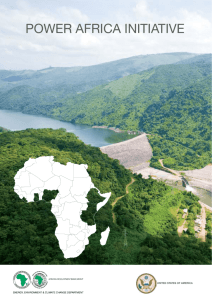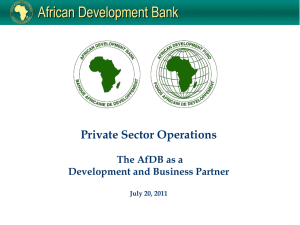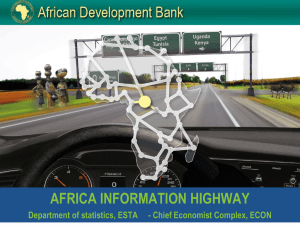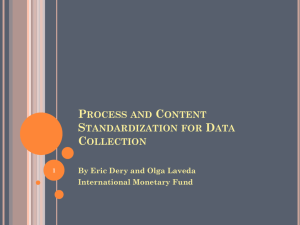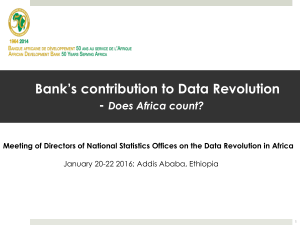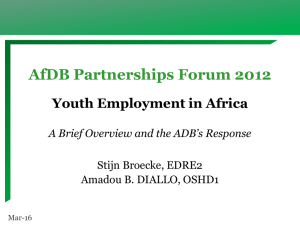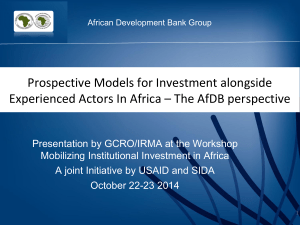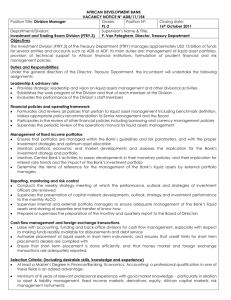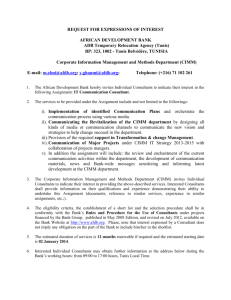BUILDING AFRICA’S DEVELOPMENT BANK: SIX RECOMMENDATIONS FOR THE AfDB AND
advertisement
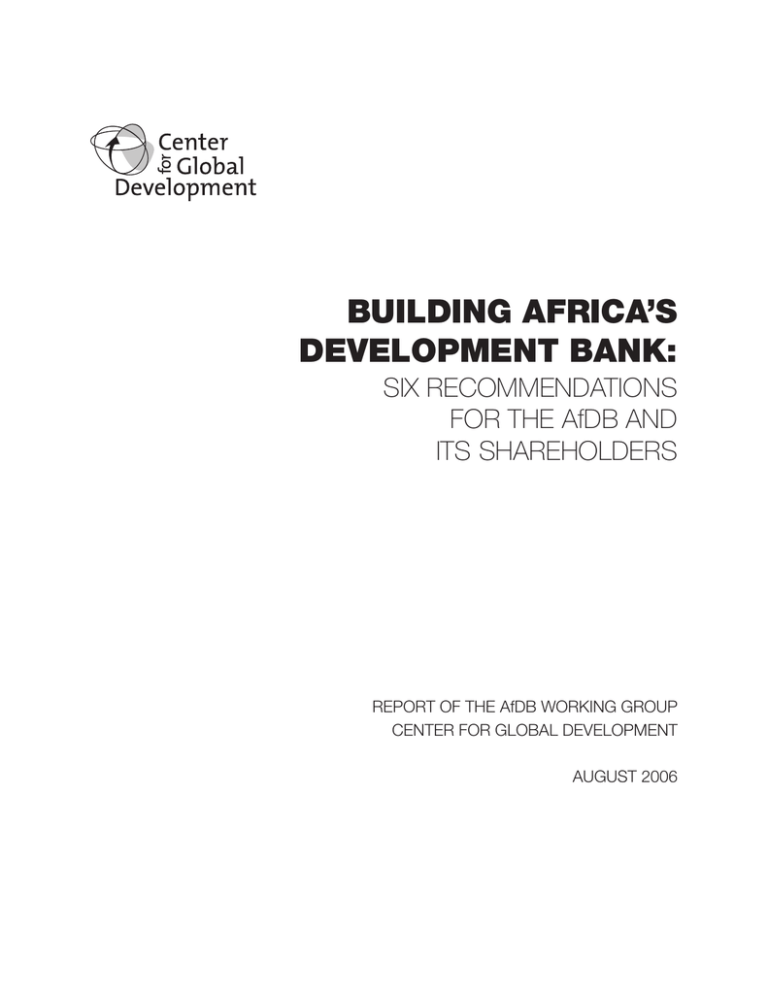
BUILDING AFRICA’S DEVELOPMENT BANK: SIX RECOMMENDATIONS FOR THE AfDB AND ITS SHAREHOLDERS REPORT OF THE AfDB WORKING GROUP CENTER FOR GLOBAL DEVELOPMENT AUGUST 2006 African Development Bank Working Group Chair Dennis de Tray Project Director Todd Moss Members Jacques Chappuis Robert Israel Willene Johnson Kassahun Kebede Caio Koch-Weser Sir Tim Lankester Strive Masiyiwa Greg Mills Papa Ndiaye Nelson Ogunshakin Steve Radelet Maria Ramos Jeannine B. Scott Tidjane Thiam Ngaire Woods Project Staff Conor Hartman, coordinator Sheila Herrling, special advisor Scott Standley, research assistant Copyright ©2006 by the Center for Global Development ISBN 1-933286-12-1 Center for Global Development 1776 Massachusetts Avenue, N.W. Third Floor Washington, D.C. 20036 Tel: 202 416 0700 Web: www.cgdev.org Contents Preface iv Executive Summary Introduction v 1 Recommendations of the Working Group Conclusion 5 12 Annex A. The African Development Bank Working Group Annex B. AfDB Eligible borrowers 13 20 Annex C. The AfDB versus other Multilateral Development Banks, 2005 21 III Preface he Center for Global Development (CGD) has taken a special interest in promoting greater effectiveness of the world’s most important development institutions. This is the third in a series of CGD reports that make strategic recommendations for the new leadership of major international organizations. Our reports draw on the deliberations of working groups we convene made up of independent experts from around the world, including scholars and former officials of country governments and of international financial and other institutions. The Hardest Job in the World: Five Crucial Tasks for the New President of the World Bank was published in June 2005 as Paul Wolfowitz took the reins of the World Bank. In January 2006 A New Era at the Inter-American Development Bank: Six Recommendations for the New President was released to provide guidance to President Luis Alberto Moreno. A fourth such report, directed to the incoming head of the Global Fund to Fight AIDS, Tuberculosis and Malaria, will be released later this year. A CGD Working Group on the African Development Bank began deliberations in the spring of 2006 tasked with developing recommendations to put the Bank back on the road to success and to maximize its ability to contribute toward Africa’s development. The Working Group operated with several guiding principles: rebuilding of the AfDB has been meaningful but is not yet finished; to succeed the President must identify and focus on a few key priorities on which the Bank has a strong comparative advantage; and, most important, the member countries must support the President in resisting the temptations of too many demands. The Working Group concluded with six achievable yet bold recommendations that provide some guidance for an agenda over the medium term. The challenge now is for the management and shareholders to come together and agree on the details of a roadmap to bring these recommendations to reality. I believe this fine report will stand the test of time, and thank my colleagues at CGD and the members of the Working Group for their commitment and willingness to be both thoughtful and bold. I hope it will be useful to President Kaberuka and to the many supporters of the African Development Bank who are committed to his success. This report was made possible in part by funding from the John D. and Catherine T. MacArthur Foundation and by the generous start-up gift of CGD Board Chairman Edward W. Scott, Jr. T Nancy Birdsall President August 14, 2006 IV Executive Summary he report that follows is the third in a Center for Global Development series designed to provide external independent advice for the new leadership of international organizations. This report summarizes the recommendations of a Working Group set up to advise Donald Kaberuka, who became president of the African Development Bank in September 2005, and the AfDB’s shareholders on the broad principles that should guide them as they continue the Bank’s renewal. President Kaberuka inherited an institution whose financial standing has been restored, but whose operational credibility remains a work-in-progress. The next few years will be critical to the AfDB’s efforts to fully recover and establish itself as a key player in Africa’s economic and social development. The challenges the AfDB faces are framed by Africa’s context: historical low growth, exclusion from the global expansion in world trade and investment, and a fragmented region of 53 mostly small economies. In addition, as the AfDB continues its rebuilding efforts, it must find ways of operating effectively in a crowded aid field with many larger players. Responsibility for the AfDB’s difficult history rests on many shoulders. The combined pressure from shareholders on all sides has muddied the Bank’s mission, fragmented its operations, and undermined its ability to make strategic choices. These pressures led to the near collapse of the Bank in 1995 and to a development agency that is today struggling to reassert itself as a principal player in African development. The Working Group came up with six recommendations, divided equally between management and shareholders, reflecting the shared nature of this responsibility. The recommendations are based on the belief that the Bank’s first challenge is to rebuild its operational reputation; it should do this by focusing on a single sector in which it has some comparative advantage, and only after it has built competence in this area should it consider taking on additional responsibilities. T Recommendations are based on the belief that the Bank’s first challenge is to build its operational reputation; it should do this by focusing on a single sector Recommendations for President Kaberuka 1. Define your future: Promoting economic growth should be the Bank’s primary objective. 2. Hone your operation skills: The AfDB needs to specialize in one area that supports economic growth. Infrastructure should be the Bank’s focus because it is one of the most serious constraints to growth and a sector where the Bank can make a difference. 3. Lead, but don’t lend, on key regional issues: The AfDB’s role is much greater than its own operations. The President must use the authority of his office to provide an African voice on critical regional and global issues. V VI Building Africa’s Development Bank The window for President Kaberuka and the shareholders to take these bold steps is narrow and will close rapidly Recommendations for shareholders 1. Back off: The number and scope of shareholder demands must be reduced. Shareholders are notorious for creating laundry lists for the multilaterals, but such demands are especially damaging for the AfDB. Shareholders must give management space and time to implement the strategy. 2. Lighten up: Transform the Board into a non-executive, non-resident body. The costs, financial as well as staff and management time, of resident executive boards are being questioned in other multilaterals, and the problem is even more acute for the AfDB. 3. Confront the location issue: The unsettled “temporary” headquarters status is a roadblock to a successful future and this uncertainty must be resolved as soon as possible. The window for President Kaberuka and the shareholders to take these bold steps is narrow and will close rapidly. The opportunity now before the institution to complete its recovery must not be lost. Introduction n September 2005 Donald Kaberuka became President of the African Development Bank (AfDB), taking over an institution still in the midst of recovery. From its inception the AfDB has set itself the goal to become the “leading development institution in Africa.” But with limited capacity and resources it has struggled to follow, let alone lead, in the 53 countries where it operates. Established in 1964 as an exclusively African institution, non-regional members joined in 1982 enabling an increase in capital and growth in Bank operations. But in the years that followed, poor management and weak financial controls brought the Bank to near collapse. The Knox Report, a 1994 evaluation of Bank practices, exposed the wide-ranging problems. In 1995 the AfDB became the first international finance institution to lose its AAA credit rating. In those bleak times, the AfDB’s very existence was in doubt. That same year Omar Kabbaj was elected president with a mandate to restore financial order. He began a ten-year restructuring, presiding over a centralization of operations, down-sizing of staff, closing of all regional offices, and a return to tight financial controls. Under Kabbaj’s leadership, the Bank restored its AAA credit rating, shareholder confidence in the Bank’s financial integrity recovered, and the lending portfolio began to expand again. But the recovery effort was just taking hold when it was disrupted by political instability and civil war in Cote d’Ivoire which forced the Bank to relocate temporarily from Abidjan to Tunis, where it remains today. President Kaberuka is thus the leader of an institution that has made substantial headway along the road to renewal but must still prove itself as an effective development agency. The AfDB Working Group (see Annex A), under the auspices of the Center for Global Development (CGD), was convened to assess the current situation and make recommendations for the Bank to complete its recovery. In particular, the Working Group considered the Bank’s goals and its need to define a realistic role in making suggestions for President Kaberuka, his management team, and the shareholders that would allow the AfDB to live up to the mandate it was given when it was first founded. I President Kaberuka is the leader of an institution that has made substantial headway along the road to renewal but must still prove itself as an effective development agency About the AfDB Group The AfDB Group comprises three institutions: •African Development Bank (ADB), the hard lending window with 14 qualifying countries; •African Development Fund (ADF), the concessional lending window for low-income members, with 40 countries; •Nigeria Trust Fund, a relatively small fund that provides low-interest loans. For more information, see Annex B 1 2 Building Africa’s Development Bank Figure 1: Aid to Sub-Saharan Africa 30% 25% Share of total ODA The challenges and opportunities for the AfDB are framed by Africa’s regional and global context Global and regional context The challenges and opportunities for the AfDB are framed by Africa’s regional and global context. In particular: • Africa’s historical low growth has simply not been enough to make a real dent in the continent’s widespread poverty, especially over the past quarter-century. Africa’s GDP per capita in real terms is today about the same as it was in 1980; for Sub-Saharan Africa it is about 10% lower. Although rates have recently accelerated—more than 20 economies had growth above 5% in 2005—growth will have to be raised and sustained if African countries are to have any chance of reaching middle-income status within the next generation or two. • Africa has mostly missed the globalization boom, with large swathes of the continent untouched by the expansion in world trade and investment. Africa’s share of global trade, for example, has dwindled from an already low 5% in the 1960s to less than half that level today. There are some bright spots, such as expansion in private interest in African banking and telecommunications, but for the most part, the business climate in Africa remains inhospitable and countries lack the linkages to the global economy. • Africa faces a crowded aid field where official aid has doubled since 2000 reaching $29 billion in 2004, with pledges by the G8 and other donors for substantial increases again in the near future. Even with these large flows, assistance is highly fragmented with the average country in Africa receiving aid from 30 or more official donors, plus hundreds of non-governmental actors. In addition, aid has been increasingly concentrated in particular areas, especially social services delivery (see Figure 1). 20% 15% 10% 5% 0% 1980-84 Social 1985-89 Infrastructure 1990-94 1995-99 Infrastructure includes Transport, Water and Energy. Source: OECD Note: Data is for Sub-Saharan Africa only. 2000-04 3 Six Recommendations for the AfDB and its shareholders • Regional integration efforts have mostly failed, resulting in a continent with many small segmented economies and few markets of any real size. Out of the 53 economies on the continent, only six have GDPs of more than $20 billion (about the size of Lithuania) and nearly half of the economies are less than $4 billion. The AfDB in this picture As the AfDB continues the process of re-establishing itself, it must recognize and work with three constraints: • Financially, the Bank is only the sixth-largest source of official finance on the continent, providing just 6% of total resources (see Figure 2). It will have to be good at what it does to find its way in a crowded field with other larger players. • Operationally, the AfDB is still struggling to establish a role where its resources and expertise are valued and where governments and other donors turn to it for advice and finance. • Intellectually, the Bank is not yet living up to its core mandate of providing leadership and an African voice on the crucial global issues affecting Africa today. Figure 2: Total Aid to Africa, 2004 10.0 All ODA to Africa = $30.4 bn $9.0 9.0 AfDB Group share of total= 6% ($1.9 bn) 8.0 7.0 (US$ bn) 6.0 5.0 $4.2 $3.9 4.0 $3.7 $3.6 3.0 $2.4 $1.9 2.0 $1.7 1.0 0.0 United States IDA France EC United Kingdom AFDB Group Other DAC (19 donors) All others Source: OECD Note: Data is for all of Africa. Responsibility for the AfDB’s current state rests on many shoulders, not least those of the AfDB’s own shareholders. Both the regional and nonregional shareholders have placed highly unrealistic expectations on the Bank: • African members have put intense pressure on the AfDB to lend in a manner that sometimes undermines the Bank’s professionalism and Responsibility for the AfDB’s current state rests on many shoulders, not least those of the AfDB’s own shareholders 4 Building Africa’s Development Bank The combined pressures from shareholders on all sides have muddied the Bank’s mission, fragmented its operations, undermined its ability to make strategic choices, and, ultimately, made it a much less effective development agency than it could be. Figure 3: MDB portfolio comparison, 2005 160 80 AsDB AsDB 120 AfDB IADB 60 100 80 AfDB 40 60 20 40 20 Average project size (US$ mn) IADB 140 Number of projects Shareholder pressures have muddied the Bank’s mission, fragmented its operations, undermined its ability to make strategic choices, and, ultimately, made it a much less effective development agency than it could be fragments its limited resources and capacity.1 An expectation that it will serve all of its many member countries with equal vigor but very limited resources, both financial and human, has resulted in a portfolio of many small, often ineffective loans (see Figure 3 and Annex C). • Demands from the non-regional shareholders have multiplied with each replenishment cycle, imposing more and more conditions on an increasingly weakened Bank. Not only has the sheer number of demands risen2, but the scope has increased as well. Although all of the multilateral development banks (MDBs) suffer from “mission creep,” the AfDB has perhaps the least capacity to cope with burgeoning mandates. 0 0 Number of projects Average project size Sources: Annual reports of the AfDB, IADB, AsDB 1 2 U.S. General Accounting Office, Multilateral Development Banks: Financial Condition of the African Development Bank, GAO/NSIAD-95-143BR, April 1995. See Table 4.2 in the latest interval evaluation, “Stepping up to the Future: An Independent Evaluation of ADF-VII, VIII and IX,” Operations Evaluation Department, AfDB, Tunis, August 6, 2004. Recommendations of the Working Group ased on the context and conditions in which the AfDB finds itself, and an analysis of the Bank’s current challenges, the Working Group developed the following six recommendations. Reflective of the shared responsibility for the AfDB’s future, these are equally divided between President Kaberuka and the shareholders. The recommendations begin with the proposition that the AfDB’s first challenge is to rebuild its operational reputation. To do this, it should first focus its lending operations on a single sector in which it has some comparative advantage. Only when it has built competence in this area should it consider taking on additional broader responsibilities. B The Bank must focus the bulk of its resources on helping to generate greater economic activity For President Kaberuka and his management team: 1. Make economic growth the defining objective of the Bank Africa’s development agenda is both wide and deep, but nothing else will matter unless the continent finds a way to grow rapidly, grow equitably, and grow sustainably. The Bank must therefore focus the bulk of its resources on helping to generate greater economic activity. Establishing growth as the AfDB’s overarching goal implies that the Bank will have to work to: • Promote private sector development. Unleashing Africa’s entrepreneurial energy is a necessary precondition for long-term economic progress. Private economic activity—and only private economic activity—can provide future employment and the ongoing tax revenues needed to support investments in social services. • Help to connect Africa’s markets. Given the continent’s relatively small markets, Africa’s future economic growth will depend on linking its internal markets as well as connecting to the global economy. There are three parts to this connectivity challenge. First, poverty will be reduced only if the poor are tied into national markets, especially rural and agricultural producers with urban consumers. Second, the continent’s fragmented national economies must be integrated in order to reduce transaction costs to intraregional trade and investment and to create markets of sufficient size to promote efficiency and attract external investors. Third, African economies can and must be linked to global markets. • Improve governance. More transparent and accountable interactions between the government and other actors and containing corruption are necessary if Africa is to put itself on a sustainable path to prosperity. 5 6 Building Africa’s Development Bank 2. Specialize in one sector that matters to growth: Infrastructure A fundamental precondition for the Bank’s rebound is that it prove its ability to be a serious player among Africa’s donors. Given current human resources, the Working Group believes that to do this it must focus—at least initially—narrowly on its operational activities. The Working Group recommends that the AfDB concentrate, over the course of the next 3-5 years, exclusively on infrastructure—especially on transportation, electricity, and water infrastructure deficits that can be shown to be key constraints to private sector development. The Working Group was clear that it was not arguing that the AfDB become solely an infrastructure bank, but rather that the next step along the road to full recovery must be to demonstrate operational competency in one area critical to Africa’s development. For the next 3-5 years the Bank should concentrate exclusively on infrastructure bottlenecks that are key constraints to private sector development Infrastructure was selected as the focus because it is a sector: • Of relative internal strength. The AfDB already has substantial experience in infrastructure (representing nearly 40% of new project approvals) and it has built a relatively positive reputation in this sector. • Relevant for clients in both lending windows. Infrastructure investment and expertise is in strong demand by the entire spectrum of AfDB borrowers, allowing the Bank Group to build capacity that can be used by both the hard and soft windows. This is not only a more efficient use of limited staff and capital, but it also helps to ensure that the Bank remains relevant, especially to its North African borrowers. • Where the Bank has an existing mandate. The AfDB has already been given responsibility for managing infrastructure investment and promotion by the New Partnership for Africa’s Economic Development (NePAD) and a special coordinating role by the Infrastructure Consortium for Africa launched in late 2005. • That can serve many needs. Addressing infrastructure needs and investment is one constructive way to approach the three areas of the growth agenda defined above. • Recent evidence suggests that the cost and reliability of transport and energy are major barriers to private sector competitiveness in Africa.3 • Infrastructure investment is an essential means to connecting the poor to markets, to promoting regional integration, and to fostering the flow of goods and services. Multi-country roads and electricity grids in particular are seen as critical to enhancing cross-border trade and more efficient energy distribution. 3 Benn Eifert, Alan Gelb, and Vijaya Ramachandran, “Business Environment and Comparative Advantage in Africa: Evidence from the Investment Climate Data,” CGD working paper 56, February 2005. 7 Six Recommendations for the AfDB and its shareholders • Infrastructure governance is an important part of the broader governance agenda, and an area in need of major improvement. If the AfDB could help upgrade selection, tendering, procurement, construction, and management of infrastructure, it would make a valuable contribution toward Africa’s fight to reduce corruption and demonstrate its ability to improve governance. • Many other critical challenges for Africa, such as social sector targets embodied in the Millennium Development Goals, have significant infrastructure components. While designating infrastructure as the primary area of specialization is in some ways a natural progression of the Bank’s current approach, it is not without major challenges. Success will depend on enhancing expertise and capacity in a range of activities, from project preparation and feasibility studies to investment of the Bank’s own capital and encouraging participation of private partners. The Bank will also need to quickly align its own lending pipeline toward infrastructure projects (see Figure 4). Developing and implementing rigorous governance standards, an economic returns-based project selection process, and a sound monitoring and evaluation system will be necessary to ensure the right infrastructure gets built the right way at the right cost—and that “white elephant” projects are avoided. In the short term, President Kaberuka’s leadership in establishing the Bank’s credibility in this area will require him to be highly selective, to say no when necessary, to deny requests in areas outside of the Bank’s strategic focus, and to reject projects that do not meet reasonable growth-impact criteria. With many other agencies working in infrastructure—principally, national governments, private investors, the World Bank, and the European Union (but, by and large, not the bilateral donors)—the Bank will also need to be assertive in establishing a leadership role to ensure coherence in the sector. To play such a role, the Bank will have to prove itself. An early indication to the other players that it is serious would be to align its own lending portfolio to an infrastructure strategy. Perhaps more With many other agencies working in infrastructure the Bank must be assertive in establishing a leadership role Figure 4: Proposed portfolio of new approvals for 2010 and 2015 (new approvals, loans and grants) 2005, Actual Industry & Mining 2% Environment 4% Finance 13% 2015 2010 Infrastructure 100% New sector Infrastructure 40% Social Sector 13% Agriculture & Rural Development 13% Infrastructure Multisector 15% 8 Building Africa’s Development Bank The AfDB’s President has an imperative beyond managing a regional development bank: to serve as a voice for Africa on African and global issues importantly, in terms of signaling, would be to provide much more hardnosed management and leadership to the NePAD and Infrastructure Consortium initiatives. Efforts so far in these areas have not built the necessary credibility, but quick action could turn these into opportunities to show the Bank’s potential. Time is of the essence. President Kaberuka and the AfDB have a fairly narrow window to establish credibility and must show results quickly. At the same time, moving fast will be difficult with the current high staffing vacancy rates and the uncertainty over the temporary status of headquarters. Since this uncertainty may remain for some time, one option that the President may want to consider is setting up a special interim infrastructure unit in a location that would allow quick recruiting and quick access to all of AfDB’s client countries. This could be at a convenient hub in Africa or even possibly in a nearby location outside the continent. (A non-regional location might have the added appeal that it would not be seen to interfere with the decision on the AfDB’s permanent location; see the final recommendation below). 3. Lead, but don’t lend, on key regional issues The AfDB’s President has an imperative beyond managing a regional development bank: to serve as a voice for Africa on African and global issues. The President must therefore use his office to provide intellectual leadership on critical issues within the development community and as a rallying point for influencing governments within the region on a range of common issues. But playing this leadership role must be explicitly separated from Bank lending operations—indeed, the Working Group advises against committing the Bank’s own capital in the areas recommended below. The President’s agenda beyond infrastructure must be chosen carefully and strategically to ensure effectiveness and influence. The topics selected must also capture the attention and passion of the President. The recommended list from the Working Group includes: 1. Governance beyond infrastructure. Corruption and governance are high on the international agenda, yet some Africa nations chafe at the notion that rich countries can and should dictate positions on these issues. The President can and must play a critical role as a bridge between the demands of donor nations and the legitimate frustrations of recipient nations trying to cope with a difficult, systemic long-term problem. 2. Business climate awareness and reforms. As part of the AfDB’s drive to strengthen Africa’s private sector, the President can elevate the prominence of business climate analysis and reforms, helping to push changes to make it easier to open, invest, and operate businesses. 3. Global or regional public goods. The right investments in global public goods, such as Africa-oriented agricultural or medical research, could improve the lives of millions of Africans. The creation of an anti-malarial vaccine or new drought-resistant crops would 9 Six Recommendations for the AfDB and its shareholders produce immediate gains for the continent. Although the AfDB should not devote its own resources to such projects, the President could use his position to promote initiatives that would impact Africa and bring a credible regional perspective to some of the debates about investing in and deploying such technologies. Implications of these three recommendations for management This proposed agenda has important implications for AfDB management if such a strategy is to succeed. First, there are staffing requirements needed to develop a skills mix that matches the operations portfolio, which will mean filling the large number of current vacancies with skills in all stages of infrastructure development, including such non-engineering skills as environmental and social assessment, rather than other specialties. As the President builds up the Bank’s research department and hires support for the Chief Economist, the skills will have to support both the Bank’s infrastructure focus and the non-lending issues identified by the President for which he and his office will play a leadership role. At the same time, the Bank need not generate all of this capacity in-house; where necessary, additional research can be done in partnership with other organizations. Second, the Working Group urges the President to proceed cautiously with decentralization. While increasing in-country presence and delegating responsibility to local offices is desirable in the long term, such steps also carry considerable risks and costs if done at the wrong time and at the wrong pace. The experience of some of the larger MDBs (and the AfDB’s own history) with multiple country offices may be worth a careful review. At a time when the Bank is still re-establishing itself, there may be value in retaining decision-making and oversight at headquarters, especially as it builds the necessary human resources to staff a more decentralized bank. Lastly, any development strategy, including one focused on infrastructure, must have monitoring and evaluation systems built in upstream. Management must be able to measure progress, identify problem projects, and find ways of encouraging institutional learning for the future. This will mean clear setting of benchmarks and aligning staff incentives with project success. Although much of the monitoring and evaluation can be done internally, the Bank should consider experimenting with the use of external independent evaluation. Such an approach would be beneficial because it increases the credibility of evaluations, thereby improving their value both inside and outside of the AfDB4. 4 William Savedoff, et al., When Will We Ever Learn? Improving Lives Through Impact Evaluation, Report of the Evaluation Gap Working Group, Center for Global Development, May 2006. Although much of the monitoring and evaluation can be done internally, the bank should consider experimenting with the use of external independent evaluation 10 Building Africa’s Development Bank For AfDB Shareholders: The strategy outlined above cannot be implemented without strong shareholder support. The Working Group therefore makes the following recommendations: Perhaps the most important element of the AfDB’s rebuilding plan will be an agreement with shareholders on what the Bank will not do 1. Back off by reducing the number and scope of shareholder demands To enable the President and his team to move forward on this proposed agenda shareholders must reduce the number of demands being placed on the institution. Recent history suggests an unfortunate move in the opposite direction as the list of demands has grown with each ADF replenishment.5 Perhaps the most important element of the AfDB’s rebuilding plan will be an agreement with shareholders on what the Bank will not do. A focus on infrastructure lending means no stand-alone lending for health and education, gender, the environment, communicable disease prevention, public sector reform, and others (see box). Except when these issues directly involve infrastructure, the shareholders must allow and encourage Bank management to say no. The next replenishment round for ADF-XI (2008-2010), will provide a critical testing ground, but the commitment itself must come now. A 5-year strategy: Roads to be built – and roads not to be taken ü Rural and urban roads ü Ports and airports ü Railways ü Energy production and distribution ü Water and sanitation ü Governance of infrastructure ü Cross-border infrastructure projects û Social sectors* û Policy lending û Multi-sector support û Environmental or wildlife programs û Agriculture* û Industry* û Conflict prevention and post-conflict* û Failed states û Gender * Except infrastructure components of a broader sector strategy 2. Lighten up with a non-executive, non-resident board The AfDB’s current governance arrangement of a full-time executive board that meets weekly and votes on nearly every loan is unnecessary, inefficient, and imposes large costs on the institution and its staff. The Bank needs to show leadership by adopting a lighter non-executive board, as is common for private companies and quasi-official bodies, which would be more efficient and supportive of the new strategic agenda. Under this new governance structure, the board would step back from day-to-day management and concentrate where its comparative advantage lies: on high-level strategy and monitoring of execution. A nonexecutive board would contribute to the development of Bank strategy, provide regular oversight to ensure that management is proceeding with the agreed plans, and check that implementation is progressing 5 “Stepping up to the Future,” op cit. 11 Six Recommendations for the AfDB and its shareholders adequately.6 Such a role could be fulfilled with six or so meetings per year that would involve strategic discussions and votes on only the largest loans.7 3. Confront the issue of headquarters location sooner rather than later The temporary status of AfDB headquarters has become a major impediment to its effective recovery and recruiting efforts. As a precondition for any long-term rebuilding, the Board must resolve this issue soon. If the board deems it useful, one option would be to nominate an independent experts panel to evaluate the conditions under which the Bank and its staff could be returned to its permanent headquarters in Abidjan and estimate the timetable needed for doing so. The panel should also be given the ex ante mandate, should it determine such a step is necessary, to establish criteria and make recommendations for potential alternative sites for a new permanent headquarters. Given the urgency of the rebuilding task facing the Bank, the panel should be constituted before the end of 2006 and should report its findings no later than the next AfDB annual meeting to be held in Shanghai, China in July 2007. 6 7 According to the Higgs Report, “The role of the non-executive director is frequently described as having two principal components: monitoring executive activity and contributing to the development of strategy.” See Derek Higgs, “Review of the role and effectiveness of non-executive directors,” UK Department of Trade and Industry, January 2003. Although this may at first appear to be a radical departure from current practice common among MDB boards of directors, it is in line with other large institutions of similar purpose. The European Investment Bank (EIB) has a non-resident board that meets only about ten times per year; the US Overseas Private Investment Corporation (OPIC) board meets only four times; and the Global Fund board normally meets only twice per year. In the corporate world, boards tend to meet more often, but have even less day-to-day management responsibility; ExxonMobil’s board, for example, meets eight times per year. Indeed, John Maynard Keynes originally argued that the World Bank and IMF needed only non-resident boards, an idea that was rejected partly because of the difficulty of travel at the time. The temporary status of AfDB headquarters has become a major impediment to its effective recovery and recruiting efforts. The Board must resolve this soon Conclusion he African Development Bank is at a critical point in its history. Its financial standing has been restored, and it must now set a clear strategy to determine and develop its core strengths. In support of this rebuilding effort, the Bank’s many stakeholders must give management the tools, space, and most importantly time needed to implement the strategy. The AfDB Working Group has laid out six recommendations for management and shareholders that we believe will restore the Bank to its rightful role as a leader of African development. The window for President Kaberuka and the shareholders to take these bold steps is narrow. The opportunity must not be lost. T 12 13 Six Recommendations for the AfDB and its shareholders Annex A: The African Development Bank Working Group The Working Group process The Center for Global Development convened the AfDB Working Group in the spring and summer of 2005 to assess the Bank’s current situation and make recommendations for the future. The Group began by asking what advantages the Bank has over other institutions, what are the Bank’s current strengths and weaknesses, and what are the sources of those weaknesses. Based on those deliberations, the Group concluded that greater operational focus was required and then debated where the Bank should concentrate its activities and where it might consider withdrawal. Once a general agreement was reached on strategic recommendations, the Group considered the implications of such an agenda and what steps needed to be taken, by both management and the shareholders, to enable such an approach to succeed. This report summarizes the conclusions of the Working Group. Biographies of Working Group members and staff * Dennis de Tray (Chair) joined the Center for Global Development in February, 2006, as the Center’s first-ever vice president. Before joining CGD, he directed the World Bank’s Mission for the five central Asian republics from Almaty, Kazakhstan (2001-2006). Previously, he served as IMF senior representative for Vietnam in Hanoi (1999-2001), and as the World Bank’s Director, Resident Staff and then Country Director in Jakarta, Indonesia (1994-1999). Before that he spent more than 20 years in research and policy positions. In 1983 he joined the World Bank as chief of its Living Standards Measurement program. The survey methodology developed under his guidance remains the standard for poverty measurement in the World Bank and in a number of other international organizations. He earned his Ph. D. in economics from the University of Chicago in 1972. Jacques Chappuis is the Managing Director and Head of Alternative Investment Product Management with Global Wealth Management. Mr. Chappuis is responsible for managing alternative investments in both the Citigroup Private Bank and Smith Barney. Mr. Chappuis joined Global Wealth Management from Citigroup Alternative Investments (CAI) where he was responsible for distribution of alternative investments in the Citigroup Private Bank and Smith Barney in North and South America. Prior to joining CAI, Mr. Chappuis was a strategy consultant at the Boston Consulting Group (BCG) in New York. At BCG, Mr. Chappuis was a * Affiliation listed for identification only. Working Group members participated in a strictly personal capacity. 14 Building Africa’s Development Bank member of the firm’s Financial Institutions Practice Area and focused on the wealth management sector, in particular on high net worth private client services and alternative investments. Prior to BCG, Mr. Chappuis was an investment banker with Bankers Trust focusing on M&A, Private Equity and Corporate Finance transactions. Mr. Chappuis holds an MBA with honors from Columbia Business School and a BA in finance from Tulane University. Conor Hartman (Project Coordinator) is the special assistant to the executive office at the Center for Global Development. Prior to joining CGD, Mr. Hartman worked for The Carter Center in multiple capacities, most recently as technical advisor to the Guinea Worm Eradication Program in South Sudan. Mr. Hartman holds a BA in history from Duke University. Sheila Herrling (Special Advisor) is a Senior Policy Analyst at the Center for Global Development. Ms. Herrling manages the Center’s MCA Monitor Initiative, providing policy analysis and research on the operations, effectiveness and impact of the U.S. Millennium Challenge Account. She is the principal contributor to the MCA Monitor blog, a coauthor with Steve Radelet of The Millennium Challenge Account: Soft Power or Collateral Damage? and The MCC Between a Rock and a Hard Place. Ms. Herrling previously served as the Center’s Director of Communications and Policy, and was Deputy Director of the development policy office of the U.S. Treasury. She has had a variety of positions in her thirteen-year tenure with the U.S. Treasury Department, including five years in Cote d’Ivoire as Advisor to the U.S. Executive Director of the African Development Bank. Ms. Herrling is also Treasurer of the Board of Directors of One World U.S. Ms. Herrling has a BA in Economics from William Smith College and a Masters in Development Economics from American University. Robert I. Israel is a Partner at Compass Advisers, LLP, a transatlantic strategic advisory and private investment firm with offices in New York, London, and Frankfurt. Prior to joining Compass he was Head of the Energy Department of Schroder & Co. Inc. He has advised on a wide variety of mergers, acquisitions, and capital raising transactions and was the exclusive advisor to Lukoil on its strategic relationship with ConocoPhillips and to Conoco Inc. on its separation from Dupont Inc. Mr. Israel is currently a Director of Randgold Resources, an African-based gold mining company; Suelopetrol C.A., a Venezuelan company engaged in seismic data gathering and exploration for oil and gas; Hart Energy Publishing, a trade publishing company covering the energy sector; API, Inc. a company which manufactures secure equipment for U.S. and foreign government agencies; and Midway Resources International, an E&P Company focused on developing oil and gas opportunities in West Africa. Mr. Israel holds an MBA from Harvard Business School and a BA from Middlebury College. 15 Six Recommendations for the AfDB and its shareholders Willene A. Johnson is an independent consultant specializing in finance and development. She is an adjunct member of the faculty of Cornell University and a member of the United Nations Committee for Development Policy. Dr. Johnson retired from the Federal Reserve System, where she was recently an Adviser in the Division of International Finance of the Board of Governors. From January 2000 to September 2001, she served as United States Executive Director at the African Development Bank (AfDB), overseeing development policies, programs, and projects. Prior to the AfDB appointment, Dr. Johnson was a vice president at the Federal Reserve Bank of New York where her career included economic research, foreign exchange, international financial markets, international affairs, and equal employment opportunity. Dr. Johnson’s education includes an A.B. in social studies from Radcliffe College, Harvard University, an MA in African history from Saint John’s University, and a PhD in economics from Columbia University. Kassahun Kebede is the founder and Managing Partner of New Yorkbased hedge fund, Panton Capital Group. Mr. Kebede’s career spans a period of more than 15 years in senior positions with three major Wall Street firms where he developed and managed profitable and innovative banking businesses. Mr. Kebede held various management positions at Deutsche Bank including European head of fixed income derivatives, global head of equity derivatives, and a bank-wide management task force concerned with measuring, assessing and reducing the bank’s exposures in emerging markets. At Merrill Lynch Mr. Kebede was head of Global Credit Derivatives. He also spent three years at Bankers Trust as a derivatives trader. Mr. Kebede earned a BS in electrical engineering from Marquette University in 1985 and a MBA from the Wharton School of the University of Pennsylvania in 1991. Caio Koch-Weser is Vice Chairman of Deutsche Bank Group. A German and Brazilian national, Mr. Caio Koch-Weser was appointed German Deputy Minister of Finance (State Secretary) in 1999, a position he held until November 2005. From 2003-2005, Mr. Koch-Weser was also Chairman of the EU’s Economic and Financial Committee, and Chairman of the Supervisory Board of German Banking and Securities Supervisory Agency (BaFin). From 1973 to 1999, Mr. Koch-Weser held a number of high-level positions in the World Bank in Washington, notably as Division Chief for the China Program (1980-86), Director responsible for West Africa (1986-1990), Deputy Treasurer and Director of Treasury Operations (1990-91), Regional Vice President for the Middle East and North Africa (1991-95), Managing Director Operations, and Member of the Executive Committee (1996-1999). He is currently a member of the Advisory Board of the Bertelsmann Foundation in Germany, a Trustee of the Institute of International Economics (IIE) in Washington, and a Board member of BRUEGEL. Mr. Koch-Weser studied economics in Germany. 16 Building Africa’s Development Bank Sir Tim Lankester was the UK’s Executive Director on the boards of the World Bank and IMF, and subsequently Permanent Secretary of the former Overseas Development Administration. He has been Director of the School of Oriental and African Studies in the University of London, and he is currently President of Corpus Christi College, Oxford. Strive T. Masiyiwa is founder, President, and CEO of South Africanbased, diversified international telecommunications group Econet Wireless. The company operates in the core areas of mobile cellular telephony, fixed public networks, internet, and satellite services in Africa, Europe and the East Asia Pacific Region. Mr Masiyiwa has also been involved in the development of Africa’s independent media. In 1999 Mr. Masiyiwa was named by the Junior Chamber International (Jaycees) as one of the “Ten Most Outstanding Young Persons of the World,” and in 2003 he was chosen as one of the “15 Global Influentials of the year” in a CNN/Time Magazine poll. He sits on the Rockefeller Foundation Board of Trustees, the Nelson Mandela Foundation Advisory Committee, and the Board of Endeavor South Africa. Mr. Masiyiwa is also active in promoting awareness on the impact of AIDS in Africa. A foundation which he and his wife founded and fund currently provides scholarships to more than 25000 orphans in Africa. Strive Masiyiwa is a graduate of the University of Wales. Greg Mills directs The Brenthurst Foundation, established in 2005 by the Oppenheimer family to develop strategies for improved economic performance in Africa. Prior to joining the Foundation, he taught at the Universities of the Western Cape and Cape Town, was the National Director of the South African Institute of International Affairs (SAIIA) from 1996-2005, and SAIIA Director of Studies from 1994-96. Dr. Mills holds a number of honorary positions, including that of Senior Research Associate of the Centre for Defence and International Security Studies and Associate Fellow of RUSI, both in the UK. He was the first South African to have received the THB Symons Commonwealth Fellowship in 1999/2000, and was a visiting fellow for the Strategic and Defence Studies Centre at the Australian National University in 1998 and at the Spanish Foreign Ministry in 2002. Dr. Mills holds a BA Honours from the University of Cape Town, and an MA and PhD from the University of Lancaster. Todd Moss (Project Director) is a Senior Fellow at the Center for Global Development. His work focuses on US-Africa relations and financial issues facing sub-Saharan Africa, including policies that affect private capital flows, debt, and aid. Mr. Moss joined the Center in July 2003 from the World Bank where he was a consultant and adviser to the Chief Economist in the Africa Region. Prior to joining the Bank, he was a Lecturer at the London School of Economics. Previously, Mr. Moss has worked as an Analyst for the Economist Intelligence Unit and was Assistant Director of US Policy Programs at the Overseas Development Council. He is currently also an adjunct professor at the Georgetown 17 Six Recommendations for the AfDB and its shareholders Public Policy Institute and a consultant working on economic and political risk analysis, economic development, and financial markets. He has a PhD from the University of London and a BA from Tufts University. Papa Madiaw Ndiaye is the Founder and CEO of Advanced Finance and Investment Group, a Johannesburg-based private equity fund management company. Prior to forming AFIG, Papa was a Director of Emerging Markets Partnership in Washington which he joined in 2000. Before EMP, he held senior responsibilities for the IFC’s investment activities in African capital markets (1996-2000.) He joined JP Morgan’s Emerging Markets Group in 1992 where he launched the firm’s securities trading in Africa and the Middle East. In 2000, Mr. Ndiaye was named Special Advisor to the President of Senegal and Chairman of the Presidential Economic & Financial Advisory Council. A citizen of Senegal, he was selected as a “Young Global Leader” by the World Economic Forum of Davos in 2004. He holds an MBA from the Wharton School of Business, an MA in International Affairs from the University of Pennsylvania’s Lauder Institute, and a BA in economics from Harvard College. Nelson Ogunshakin took over as chief executive of ACE in January 2004. Mr. Ogunshakin is a civil engineer with extensive industry experience in the construction and property sector. He has previously worked in a number of director level positions with multidisciplinary consultancy firms, WSP (Building) Group, High Point Rendel Group, and was most recently managing director of the consultancy AEO Group. Mr. Ogunshakin has extensive UK and international (Europe, Africa, Middle East, Asia and North America) experience in the construction and infrastructure development sectors where he has been involved in project development and delivery, financial management, PFI advisory, corporate restructuring, investment planning, and business development. Mr. Ogunshakin holds an MS in construction management and an MBA in strategic management and project finance. He is a fellow of the Institution of Civil Engineers, the Chartered Institute of Arbitrators, and the Chartered Institute of Marketing. Steven Radelet is a Senior Fellow at the Center for Global Development, where he works on issues related to foreign aid, developing country debt, economic growth, and trade between rich and poor countries. He was Deputy Assistant Secretary of the U.S. Treasury for Africa, the Middle East, and Asia from January 2000 through June 2002. From 1990-2000 he was on the faculty of Harvard University as a Fellow at the Harvard Institute for International Development (HIID), Director of the Institute’s Macroeconomics Program, and a Lecturer on Economics and Public Policy. From 1991-95 he was HIID’s resident advisor on macroeconomic policy to the Indonesian Ministry of Finance. He served in a similar capacity with the Ministry of Finance and Trade in The Gambia from 1986-88. He was also a Peace Corps Volunteer in Western Samoa from 1981-83. Mr. Radelet has a PhD and an MPP from Harvard University and a Bachelors degree from Central Michigan University. 18 Building Africa’s Development Bank Maria Ramos is Chief Executive of Transnet LTD. From May 1995 until June 1996, she served as the Deputy Director-General of Financial Planning in the Department of Finance in the Republic of South Africa. She then became Director-General of the Department (which was subsequently renamed the National Treasury). She held the job until end of 2003 when she left to take up her current assignment. Prior to joining the government, she worked as a Research Officer at the Centre for Research into Economics and Finance at the London School of Economics. She also taught Economics at the Universities of the Witwatersrand and of South Africa. Her research work also included stints at the Macro-economic Research Group (MERG), the Inflation Project, the African National Congress, and as coordinator of the Economics Study Commission at the Centre for Development Studies. An accomplished academic, Ms. Ramos has published and presented a number of papers nationally and internationally. Jeannine B. Scott is currently the Senior Vice President of Africare. Prior to this Ms. Scott worked as a private consultant from 2001-2003. She held an appointment from the U.S. Department of Treasury to the African Development Bank as Advisor and Alternate to the U.S. Executive Director from 1998-2001. From 1992-1998 Ms. Scott held several other staff positions at the AfDB. Her earlier career was spent with Africare – at headquarters and in the field. Ms. Scott holds memberships in The Council on Foreign Relations; The Women’s Foreign Policy Group; the Society for International Development; Women Impacting Public Policy; the Partnership to Cut Hunger and Poverty in Africa; and UNIFEM. She also serves as a board member to Howard University Law School’s World Food Law Institute and Friends of the University of Johannesburg. Ms. Scott holds an AB degree from Vassar College in Political Science and Africana Studies and a Master’s degree in International Relations from Yale University. Scott Standley (Project Assistant) is a Research Assistant at the Center for Global Development. Before joining the Center he was as a Research Consultant for NetAid and previously worked on projects for the World Food Programme and the International Labour Organization. He holds a Bachelor of Arts in Economics and International Relations from the University of Pennsylvania and a Master in Public Policy from the Kennedy School of Government at Harvard University. Tidjane Thiam became Managing Director of Aviva International in January 2006 having served as Group Strategy and Development Director since 2002. Mr. Thiam began his professional career as an international consultant with McKinsey & Company. In 1994 he became the first Ivorian Chief Executive Officer of the National Bureau for Technical Studies and Development (BNETD). In 1998 Mr. Thiam was appointed Chairman of BNETD and Minister of Planning and Development of Côte d’Ivoire, a position he held until the coup d’etat in December 1999. Mr. Thiam left Côte d’Ivoire after the coup to rejoin 19 Six Recommendations for the AfDB and its shareholders McKinsey as Partner. Mr. Thiam currently co-chairs with Ernesto Zedillo, former president of Mexico, an international task force on Global Public Goods. He is also a member of the UK’s Commission for Africa and serves as a council member for the Overseas Development Institute. Mr. Thiam holds engineering degrees from the Ecole Polytechnique in Paris and the Ecole Nationale Supérieure des Mines de Paris and an MBA from INSEAD. Ngaire Woods is Director of the Global Economic Governance Programme and Dean of Graduates at University College, Oxford. Her most recent book is The Globalizers: The IMF, the World Bank and their Borrowers (Cornell University Press, 2006). In 2005-2006 she served on a three-person external panel reporting to the IMF Board on the effectiveness of the IMF’s Independent Evaluation Office. She is an Adviser to the UNDP’s Human Development Report and was a member of the Commonwealth Secretariat Expert Group on Democracy and Development chaired by Manmohan Singh which reported in 2004. Educated at Auckland University (BA in economics, LLB Hons in law), Ms. Woods completed an M.Phil in International Relations (with Distinction) and D.Phil. as a Rhodes Scholar at Balliol College, Oxford. She won a Junior Research Fellowship at New College, Oxford (1990-1992) and taught at Harvard University (Government Department) before taking up her Fellowship at University College, Oxford. 20 Building Africa’s Development Bank Annex B: AfDB Eligible borrowers African Development Bank (hard window), 14 countries Algeria Botswana Egypt Equatorial Guinea Gabon Mauritius Morocco Namibia Nigeria* Seychelles South Africa Swaziland Tunisia Zimbabwe* African Development Fund (soft window), 40 countries Angola Benin Burkina Faso Burundi Cameroon Cape Verde Central African Rep. Chad Comoros Congo, Dem. Rep. Congo, Rep. Cote d’Ivoire Djibouti Eritrea Ethiopia Gambia Ghana Guinea Guinea-Bissau Kenya Lesotho Liberia Madagascar Malawi Mali Mauritania Mozambique Niger Nigeria* Rwanda Sao Tome & Principe Senegal Sierra Leone Somalia Sudan Tanzania Togo Uganda Zambia Zimbabwe* *Nigeria and Zimbabwe are eligible for both facilities. Note: Libya is a member but is not eligible for borrowing. 21 Six Recommendations for the AfDB and its shareholders Annex C: The AfDB versus other Multilateral Development Banks, 2005 Financial ($ millions) IBRD + IDA Subscribed Capital (callable + paid-in) Approvals of which from concessional window Disbursements of which from concessional window AfDB Group IDB AsDB 189,718 30,924 100,953 50,163 22,307 3,278 7,148 7,233 8,696 2,032 410 2,527 18,672 1,843 5,323 4,7451 8,950 988 424 1,2471 Operations/Human Resources IBRD + IDA Number of Projects Approved Total Staff AfDB Group IDB AsDB 278 102 103 127 8,700 1,020 1,852 2,456 Number of Regional/Country Offices 109 9 29 26 Countries eligible for borrowing 145 53 26 43 8,862 791 2,006 4,519 61 15 77 105 5,302 877 534 3,393 37 17 21 79 GDP of Eligible Countries ($ billion) 2 average GDP ($ billion) Population of Eligible Countries (millions)2 average (millions) Administrative Comparison IBRD + IDA Projects per Eligible Borrowing Country Average Project Size ($ millions) Approvals per Eligible Country ($ millions) AfDB Group IDB AsDB 1.92 1.92 3.96 2.95 80 32 69 57 154 62 275 168 Staff per project approval 31 10 18 19 Staff members per eligible borrowing country 60 19 71 57 Disbursement data for AsDB includes only lending disbursements. GDP and population figures are for 2004. Sources: AfDB 2005 Annual Report; ADB 2005 Annual Report; IDB 2005 Annual Report; World Bank Group 2005 Annual Report; World Development Indicators. 1 2
